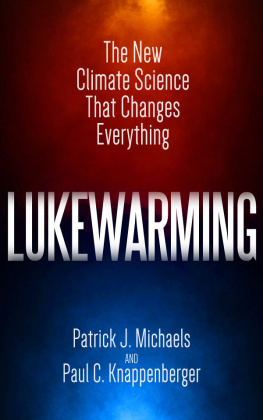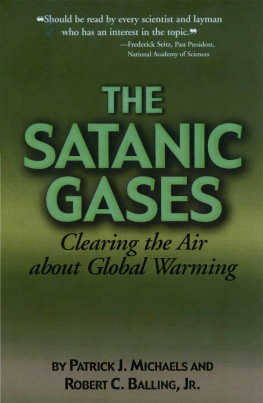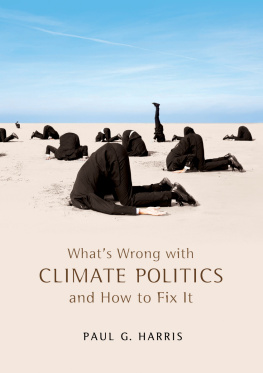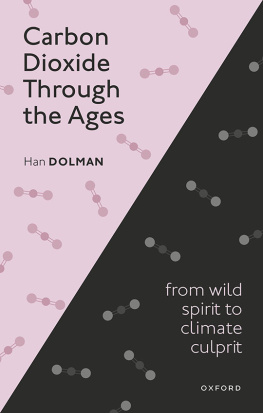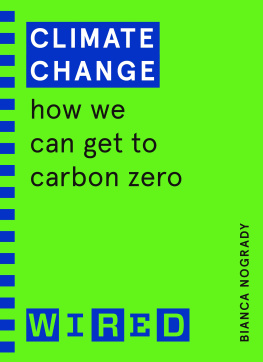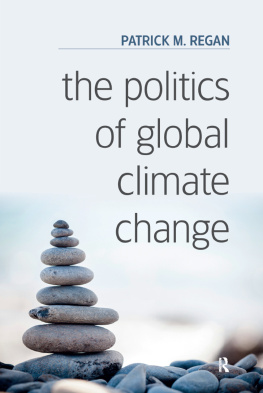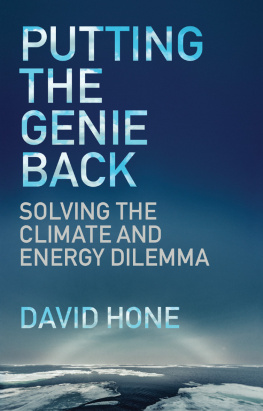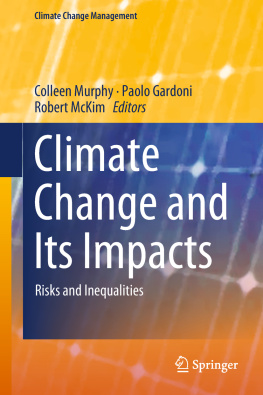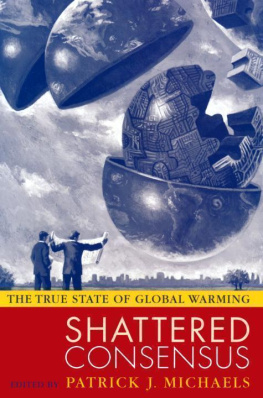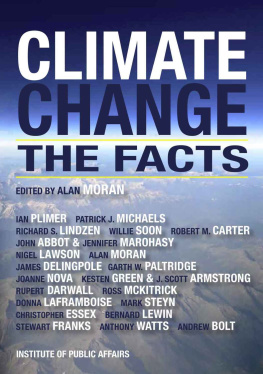Contents
Many people have helped with this book. They include Cato Institute vice presidentJohn Samples who suggested it be written after Matt Ridley published My Life asa Lukewarmer in the Times (London) on January 19, 2015. Ridley accurately portraysthe difficulty of being a moderate in a climate of extremes. John, who is the bestprofessional adviser Ive ever had, suggested I write about the science supportingthe middle-of-the-road perspective concerning climate change. I believe the evidenceis strongand growing strongerthat the denouement of the climate issue will be lukewarmnot only in terms of policy, but also in temperature.
Global warming gets persistently distorted (as do a number of other scientific fields)by an incentive structure that awards money and advancement for loudly proclaimedscience and flashy results. Such science largely is funded by a government that expectssomething in return. Scientists get that message without being told: provide supportfor our policies and your issue will continue to be opulently funded; you will receivetenure and never again fly in coach. The horrifically bad U.S. National Climate Assessmentsof climate change are Exhibits One, Two, and Three in all of this, as is detailedin this book.
Researchers now are showing that these problems arent limited to climate science.The philosophical foundation for this book stands on the work of Stanford UniversitysDaniele Fanelli and John Ioannidis and the University of Virginias Brian Nosek,who are documenting the decrepitation of societys canon of knowledge.
Terence Kealeya great friend, true gentleman, and scholaralso encouraged me tolook at this large and disturbing picture. Ed Crane, Cato Institutes former CEO,has been my best supporter and fostered Cato Institutes new Center for the Studyof Science. It may seem odd, but many in the libertarian world naively believe thatscience is where truth dwells, and Crane, in his inimitable fashion, ended the debateas to whether Cato Institute should study this. John Allison, Eds successor, madesure the vulnerable Center for the Study of Science lived well and prospered as itbecame more established during Cato Institutes leadership transition. John andEd are polar opposites in management style, but both have been wonderfully supportive,often in the face of considerable opposition.
Thanks also to Princeton University physics professor Will Happer, another true gentlemanin a world of scientific brutes, for providing backup power when my science wouldinexplicably flame out. The original version of this manuscript contained a mistakeon radiative transfer and he caught it. Happer is a physics scholar in the best traditionof his university, one that seems to have lost its way in so many other fields. Whereare more Happers when we need them so much? Thanks also to Judith Curry, professorof earth and atmospheric science at the Georgia Institute of Technology, for a criticalread and very helpful suggestions as the manuscript was struggling through puberty.
David Wojick, with his doctorate in history and the philosophy of science, once laboredin the belly of the beast at the U.S. Department of Energy. He has provided valuableinsights (and text!) about the way governments and environmental scientists interact.At a more basic level, Khristine Brookes and Joe Verruni at Cato Institute provideinvaluable philosophical advice on how to really communicate. I am also indebtedto my coauthor Paul C. (Chip) Knappenberger, who understands the technicalities ofclimate science better than anyone I know. The world of climate science knows heis among the bestever.
Then theres Rachel. I always think my first drafts are great. She disagrees andmakes them much better. Prior to the showing of institutional support for the newscience center, she strongly encouraged me to broaden my study of science horrorsbeyond the climate change issue. She thought it a good idea that I seek out scholarswho could help me do so.
Now I hate this phrase, but Im going to circle back to Ridley. Besides being theinspiration for this book, he has played a much larger role in my life than he mayknow, for better or worse.
Back when I could still terrorize rightfielders in amateur softball, Rachel was playingon Catos co-rec team and lost a front tooth to a hot grounder. She thought the guyministering to her was kinda cute. In graduate school at the University of Glasgow,shed been introduced toand was quite taken withRidleys Origins of Virtue. I askedher if shed like to meet him. That gave me some cred, so thanks, Matt. Rachel andI will be married next summer in Scotland and, Matt, youre invited.
Pat Michaels
Marshall, Virginia
August 2015
If present trends continue, the world will be... eleven degrees colder by theyear 2000. This is about twice what it would take to put us in an ice age.
Kenneth E. F. Watt
Our national political discourse is about as polarized as it has been since the CivilWar, and it is affecting all sorts of issuesforeign policy, group rights, and healthcare, to name a few. Likewise for global warming, the media sorts people into alarmistor denier campswords needing little further explication. But theres a third groupnot as visible, not as extreme, and yet possessed with substantial explanatory powerof which the public is, at best, only vaguely aware. These are the lukewarmers.Thats us.
The lukewarm synthesis of global warming is simple. Increasing concentrations ofcarbon dioxide and other greenhouse gases exert a mild warming pressure on the loweratmosphere. This has been known for 150 years. But lukewarmers have been aware forsome time that something isnt right with the climate projections made by generalcirculation climate models. Nearly 30 years ago, it became obvious that the modelswere predicting far too much warming in response to carbon dioxide changes. Lukewarmersbelieve the evidence of some human-caused climate change is compelling, but it ishardly the alarming amount predicted by the models.
Lukewarmers tend to be science watchers who have an inherent interest in the processesof the profession. We are concerned about the unquestioning attitude of the manyclimate modelers who have testified to the U.S. Congress about their forecasts. Giventhe general knowledge that the models have been too hot, the modelers have suppliedsome other factor that cools them down. Most lukewarmers thought the applicationof such a competing emissionsulfate aerosolwas an obvious Band-Aid because it allowedmodelers to simulate the past as perfectly as they wanted. The possible range ofsulfate cooling effects is so large that any value that fits the past could (andwould) be selected. Historians of science have extensively documented how difficultit is for scientists to abandon their paradigms (in this case, the notion of a disastrouswarming). Sulfate aerosol has allowed climate modelers to hold onto their paradigmfar longer than is warranted.
Newer, more robust estimates of the sulfate cooling effect are disclosing what thelukewarmers long suspectednamely, that the sulfates are more of a cheap fix thanan explanatory reality. The truth is that the various families of climate modelsare just too darned hot or, to put it in the jargon of the day, their sensitivityto carbon dioxide is too high.
So it follows that climate policies based on those models similarly are too hot.Moreover, the human nature of the modeling community impedes the utterance of lifesthree most important words: we were wrong. Consequently, those who study the effectsof climate change continue to produce a florid literature of alarming climate changeimpacts. When summarized in various government compendiaperhaps for use by a regulatoryagency like the U.S. Environmental Protection Agencythe picture therefore alwaysis alarming and is likely to be wrong. Lukewarmers are aware of this problem andtend to be skeptical of the impacts literature. This book provides myriad examplesof the misuse of the hot models and the tremendous incentives that exist for theircontinued misuse.

